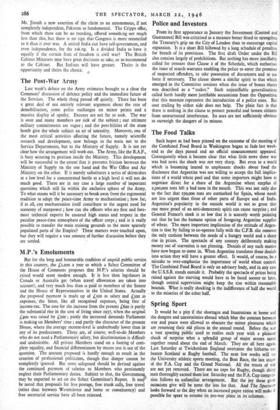The Food Talks
Such hopes as had been pinned on the outcome of the meeting of the Combined Food Board in Washington began to fade last week- end as the days passed and no official announcement appeared. Consequently when it became clear that what little news there was was bad news the shock was not very sharp. But even to a world which is becoming inured to unpleasant shocks about food the disclosure that Argentina was not willing to accept the full implica- tions of a world wheat pool and that some importers might have to negotiate direct for a share of the Argentine wheat surplus of 2,500,000 tons left a bad taste in the mouth. This was not only due to the fact that 250,000 tons are earmarked for Spain, whose needs are less urgent than those of other parts of Europe and of India. Argentina's popularity in the outside world is not so great that one more proof of an anti-democratic spirit can cause surprise ; and General Franco's stock is so low that it is scarcely worth pointing out that he has the humane option of foregoing Argentine supplies of wheat. The more important implication of the attitude of Argen- tina is that by failing to co-operate fully with the C.F.B. she removes the only cushion between the needs of a hungry world and a sharp rise in prices. The spectacle of any country deliberately making money out of starvation is not pleasing. Denials of any such motive have now begun to come in. When Argentina translates these denials into action they will have a greater effect. It would, of course, be a mistake to over-emphasise the importance of world wheat control. The Combined Food Board is only an advisory body, and in any case the U.S.S.R. stands outside it. Probably the spectacle of prices being raised against the• starving would have to be faced sooner or later, though central supervision might keep the rise within reasonable bounds. What is really shocking is the indifference of half the world to the miseries of the other half.






























 Previous page
Previous page